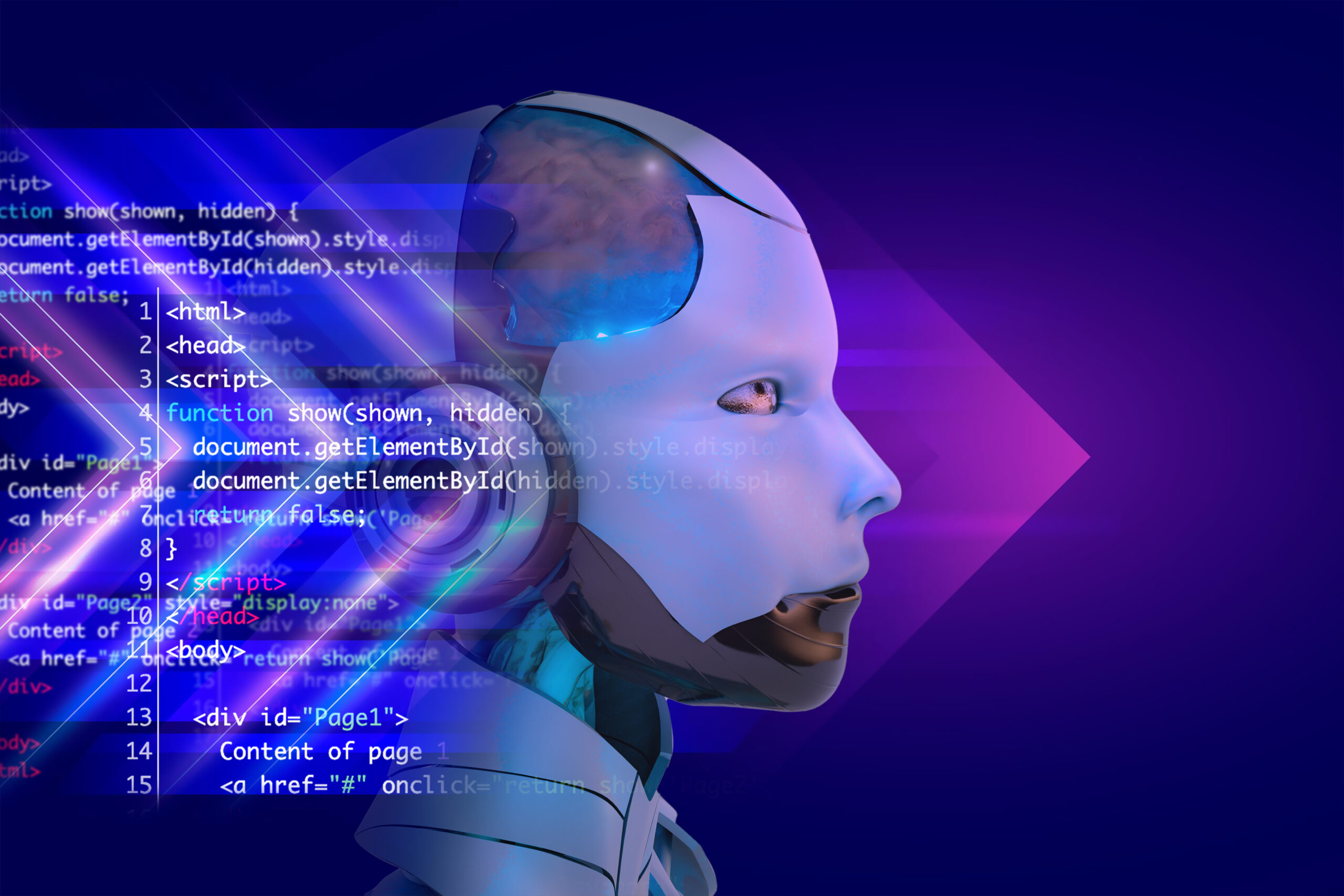Reshaping the Work Landscape with AI
By Norhan Gamal – Technical Content Creation Team
17/11/2024

From redefining job roles to integrating into business processes, AI presents both challenges and opportunities.
Artificial Intelligence (AI) is rapidly transforming the world of work, ushering in a new era where machines collaborate with humans to drive productivity and innovation. With its ability to automate tasks, analyze data, and make intelligent decisions, AI is reshaping the job landscape across industries.
In the ever-evolving landscape of technology, AI is emerging as a transformative force, poised to revolutionize the way we work. As businesses across industries increasingly integrate AI into their operations, the impact on the workplace is becoming more profound, promising a future that is both exciting and challenging.
One of the most significant ways AI is changing the work dynamic is through automation. Mundane, repetitive tasks that once consumed valuable time are now being done in seconds via AI. This shift allows all of us to focus on more complex, creative, and strategic aspects of our roles. From data entry to employee queries, AI is streamlining processes, boosting efficiency, and freeing up human capital for more meaningful contributions.
AI’s impact on job roles: Reskilling for the new landscape
Shankar Nagalingam, VP of Human Resources at Lumileds, highlights a thought-provoking statistic from the World Economic Forum. Their study predicts that AI will displace 85 million jobs globally by 2025. However, the outlook isn’t entirely bleak. The same study forecasts the creation of 97 million new roles in the AI era, such as AI and machine learning specialists, data scientists, data analysts, robotic engineers, and digital transformation specialists. These roles will be in high demand across various fields, including HR, finance, and IT.
Consol Partners. (2024, August 08). The future of work: How AI is reshaping the workplace.
The complex interactions between AI and employment come to light through the compilation of recent research, revealing how AI technologies are not only modifying existing roles but are also instrumental in creating new job opportunities. With projections indicating potential global productivity increases from 0.2% to 3.3% annually, the impact of AI on work efficiency and job enhancement is significant. However, the adoption of AI also brings forth important ethical considerations and demands effective governance.
Akustina Morni. (2024, June 24). AI’s Impact on Work and Employment Examined in New Publication.

The End of the 9-to-5!
LinkedIn co-founder Reid Hoffman recently shared his thoughts on the future of work. He pointed out that, by 2034, work will become more fluid, dynamic, and driven by automation and artificial intelligence. Gone will be the days of rigid schedules, office cubicles, and predictable routines. But why?
Cesar Torrecilla. (2024, September 24). AI is Reshaping the Future of Work. Again.
We’ve all witnessed the digital disruption across various industries, but Hoffman’s prediction suggests we’ve only scratched the surface. The relentless evolution of AI and automation tools is on the cusp of taking over mundane, repetitive tasks, and even complex decision-making processes. And that brings us to the heart of the matter: AI is changing the very definition of what we call “work”.
In this article, we delve into the future of work and explore how artificial intelligence is revolutionizing workplaces and redefining the skills required for success.
Beyond the technology: Fostering a culture of AI adoption
Automation and Job Transformation:
AI-powered automation is streamlining repetitive and mundane tasks, allowing workers to focus on more strategic and creative aspects of their roles. Routine tasks such as data entry, document processing, and customer support can now be efficiently handled by AI systems, freeing up human workers to engage in higher-value work that requires critical thinking and problem-solving skills.
Collaborative Intelligence:
AI is not replacing human workers; instead, it is augmenting their capabilities. Collaborative intelligence, the synergy between humans and AI, is becoming the new norm in the workplace. AI systems can analyze vast amounts of data and provide insights that inform decision-making, empowering employees to make more informed choices and drive innovation.
Upskilling and Reskilling:
As AI automates certain tasks, there is a growing need for workers to acquire new skills to remain relevant in the job market. Upskilling and reskilling initiatives are becoming increasingly important to equip individuals with the knowledge and expertise required to work alongside AI technologies.
New Roles and Job Opportunities:
While some job roles may become automated, the rise of AI is also creating new roles and job opportunities. AI specialists, data scientists, AI trainers, and ethical AI experts are in high demand as organizations seek to leverage the power of AI.
Ethical Considerations:
As AI becomes more integrated into workplaces, ethical considerations arise. Issues such as bias in AI algorithms, data privacy, and transparency need to be addressed to ensure the responsible and ethical use of AI in the workplace. Organizations must prioritize ethical AI development, foster diversity, and inclusivity, establishing frameworks to ensure fair and unbiased decision-making.
Embracing Change and Collaboration:
To thrive in the future of work, organizations and individuals must embrace change and cultivate a culture of collaboration. The ability to adapt to new technologies, embrace continuous learning, and work effectively with AI systems will be critical. Collaboration between humans and AI will unlock new possibilities, leading to increased productivity, innovation, and improved outcomes.
What’s clear is that the future is already here—it’s just not evenly distributed (William Gibson). If you’re a business leader, this shift isn’t something to fear but to embrace. By preparing now, companies can stay ahead of the curve and unlock new opportunities. What’s your plan for the future of work?

The future of work is being reshaped by artificial intelligence, presenting both opportunities and challenges. AI-powered automation is transforming job roles, necessitating upskilling and reskilling efforts. Collaboration between humans and AI is becoming the norm, with new job opportunities emerging. Ethical considerations and the ability to adapt to change will be essential. By harnessing the power of AI and embracing the evolving job landscape, individuals and organizations can navigate the future of work successfully.
A strategic approach to AI integration, Businesses must start smart!
Duggal offers valuable advice for businesses new to AI: “Clearly define the business problem you want to solve. Align with your leadership on the biggest problems AI can impact. Remember, technology is a means to an end, so get the fundamentals right. Establish a clear data strategy and experiment with proof-of-concepts.”
Duggal advocates for the “10-20-70 rule”: start with experiments (10%), scale successful ones (20%), and then maximize and realize value (70%). This involves reimagining your business, creating new processes, and ultimately transforming your organization. Fostering a learning culture and partnering with HR and other functions can significantly accelerate adoption and business impact for digital transformation initiatives.
Consol Partners. (2024, August 08). The future of work: How AI is reshaping the workplace.
My conclusion – the advent of AI is reshaping the way we work, offering unprecedented opportunities for efficiency, collaboration, and innovation. Embracing this technological shift requires a proactive approach to skill development, a commitment to ethical considerations, and a readiness to adapt to the dynamic nature of the evolving workplace. The future at work is undeniably AI-driven, and those who navigate this transformation strategically are poised for success in the era of intelligent automation.
AI is poised to transform industries, presenting both challenges and opportunities. While concerns about job displacement are valid, the emergence of new roles highlights the potential for growth and transformation. For organizations, the key lies in incremental implementation, ensuring data quality, and fostering a culture of AI adoption. By aligning with leadership and focusing on clear business problems, businesses can harness the full potential of AI, transforming operations and driving future growth.
To dive deeper into specific strategies and practical considerations for dealing with AI at work, reach out to DigiNation’s digital experts.

